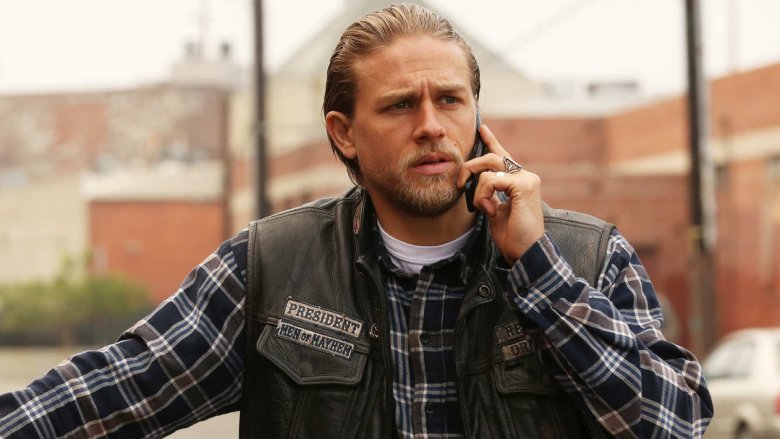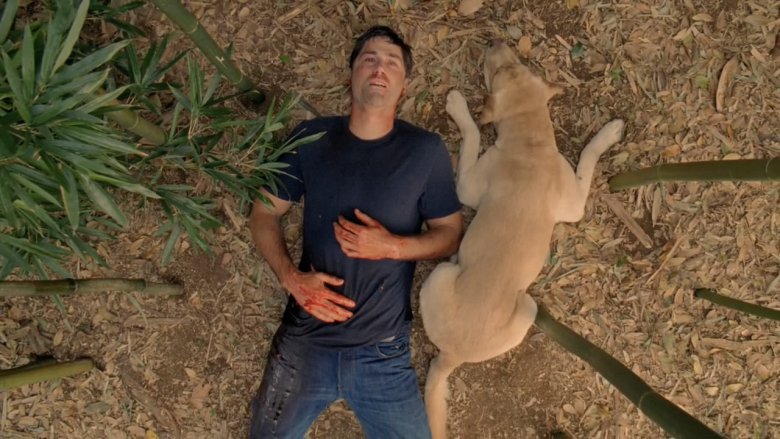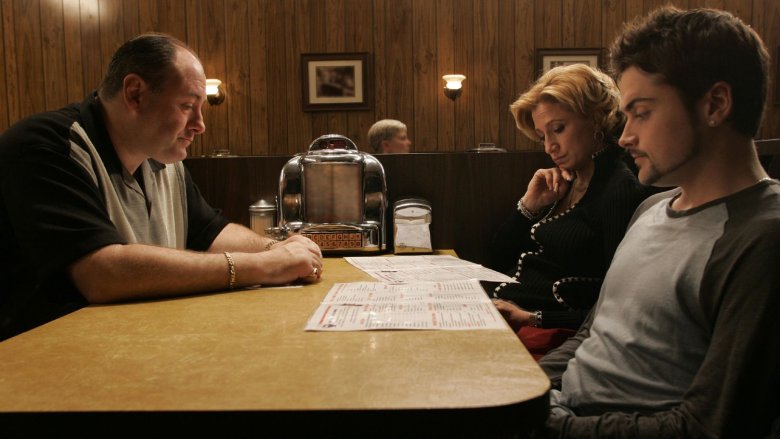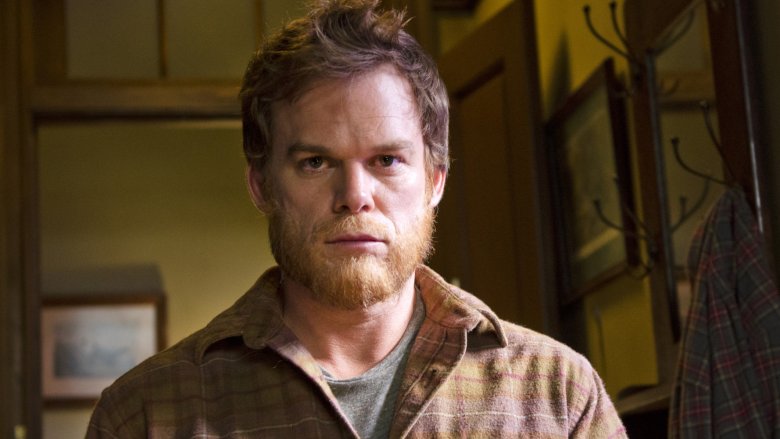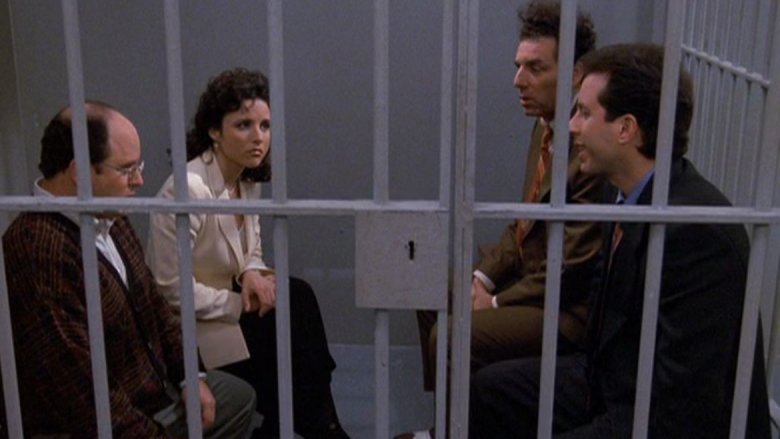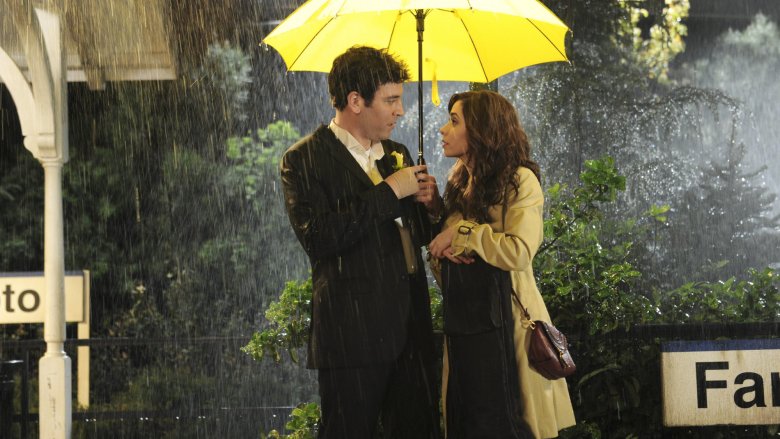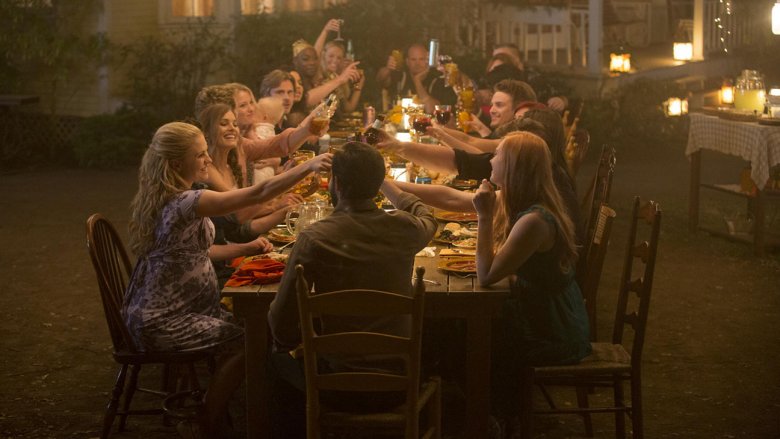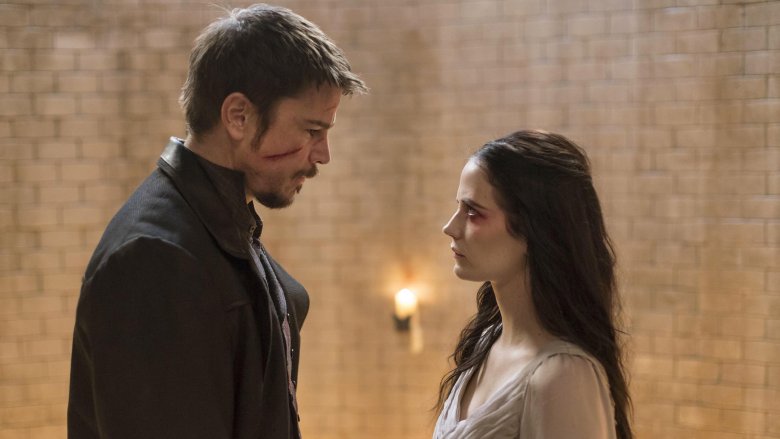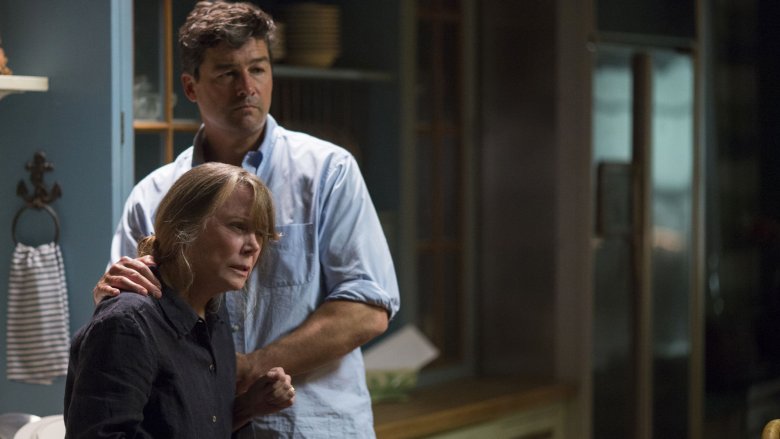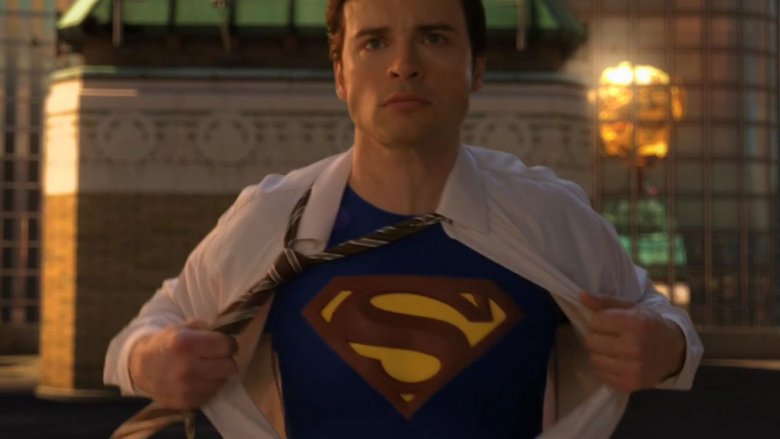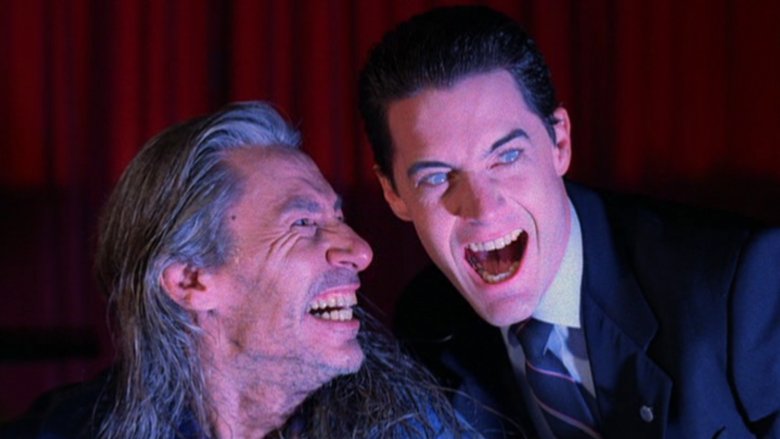The Most Frustrating TV Finales Ever Made
There's nothing like a TV series finale that gives the show's characters and stories — not to mention the viewers who've faithfully followed along — a truly satisfying conclusion. A finale that does justice to the story it's bringing to an end can elevate a show's reputation to new heights. It might seem unfair, but the last episode can really make or break a show — and unfortunately, there are plenty of finales that fall into the latter category.
It's a tremendously grating experience. Watching a movie only takes a couple of hours, but investing time in a TV show — be it through binge viewing or following over years in real time — is a bigger investment. To put that much time into a story, only to have it stumble at the last moment, can make the whole show feel like a waste of time. From controversial conclusions to all-out storytelling disasters, these episodes rank among the most frustrating TV finales ever made.
Lost lacks answers
When a show is structured around increasingly complex mysteries, it had better do everything in its power to make sure that when the time for answers comes, it sticks the landing. Lost is, from the very first episode, that kind of show. Its mysteries are numerous and ever-growing, intertwining with one another until the viewer has no choice but to go full-on conspiracy theorist trying to decipher them. Fortunately, the show anchors its increasingly dense plot with some stellar character work. Unfortunately, choosing to focus on those characters over answering its own questions made for one of the most divisive finales of all time.
If you watch the show for the journeys its characters take, you'll likely be fine with the Lost finale. However, if you want answers to the mysteries you've puzzled over for six seasons, the finale will frustrate you beyond belief. The show's final episode eschews hard answers to its longest-running questions in favor of character resolution and quiet moments that resolve series-long arcs. It isn't bad, per se, but it's excruciatingly unfulfilling if your primary investment is in the show's mysteries and world-building.
Sopranos blackout
A prestige HBO hit that presaged the dawn of Peak TV, The Sopranos elevated the medium of television, blurring long-standing lines between small screen and the cinema. After six seasons and countless awards, there was one question on every viewer's mind going into the finale: would mob boss protagonist Tony Soprano survive? The writers of the show had stacked the deck against him, and it seemed a reckoning was coming. It was the only question the finale needed to answer... and it didn't.
Leading up to the last scene, the Sopranos series finale is basically great, although the only thing most people remember is that final shot: Tony, out to dinner with his family, notices a man walk into the restaurant. He eyes the man apprehensively. Is he just a fellow diner or a hitman out for blood? The tension builds as his family arrives for dinner, but we never find out for sure what happens — the screen abruptly cuts to black, leaving Tony's fate unresolved. It's an insanely abrupt ending to the story, and while some love it, it's hard to not empathize with anyone who doesn't.
Dexter goes out with a whimper
To be clear, Dexter had gone pretty far off the rails by the time its last episode arrived. The show's first four seasons delivered entirely on the promise of the source novels with a consistently engaging story about a serial killer who happened to be a crime scene analyst — and who aimed his sinister vice at criminals who escaped the law. Dealing with the constant cat-and-mouse tension of the authorities trying to discover Dexter's true identity made for great television; unfortunately, as the show went on, it delivered diminishing returns, none more disappointing than the series finale.
By this point, the show had already wandered into a bizarre final storyline and managed to botch the only good story the show had left to tell — Dexter's identity being discovered — by sending him off not in a tense standoff, turning himself in, or in a hail of gunfire. Instead, he faked his own death and escaped to Oregon, working as a truck driver. It all added up to a bizarre and massive letdown for fans of a once-addictive show.
The finale about nothing
Leave it to Larry David to write a series finale that gleefully subverts its audience's expectations — and even suggests viewers might actually be bad people for sympathizing with the show's protagonists. Seinfeld built its brand on uncomfortable, awkward humor that thrives on characters far more loathsome than your typical comedy protagonists — and became a generational landmark in the process. The show remains massively influential, paving the way for future hits like It's Always Sunny in Philadelphia. The series finale, however, is notorious for all the wrong reasons.
There weren't exactly unanswered questions or dangling plot threads leading up to the finale, but some semblance of conventional closure was to be expected after nearly ten years on the air. Instead, the last Seinfeld episode found Elaine, Jerry, George, and Kramer on trial for laughing at a man being held at gunpoint instead of intervening. Over the course of the trial, every person they've wronged over the course of the series testifies against them, putting into perspective just how disgusting each character is. By the end, they're in jail. With a couple of decades worth of distance, it looks more like an admirably bold note to end on. Nonetheless, it's extremely polarizing to this day, and it's easy to understand why.
How I Met Your Aunt Robin
How I Met Your Mother kind of spells it all out in the title, doesn't it? No matter how long the show runs, how many diversions it takes, or how many other stories it explores, it's ultimately going to be the tale of how the protagonist meets the mother of his children. In that respect, the writers really shouldn't have had much trouble figuring out where to take the series finale. As long as it resolved the answer to the question of how Ted Mosby met his kids' mom, viewers were going to be pretty happy. Unfortunately, many of them weren't.
Rather than wrap the show up with the plot as dictated, the writers added on a last-minute stinger: the mother passed away before Ted started telling the story to his kids, who insist that the whole time, he's been in love with his friend Robin (a romantic pairing the show had already tried before Robin moved on and married Neil Patrick Harris' Barney). It betrayed the entire ethic of the show and the story it had been telling for so long. To make it all the more frustrating, they actually shot the perfect ending — and went with the Robin one instead. As Adele might say, we could have had it all.
True Blood, new blood
When your show is anchored by the question of which love interest the protagonist will end up with, you'd better answer it when it comes time for the finale. True Blood is very much a show centered around this question. Anna Paquin's Sookie Stackhouse, the small-town waitress who finds herself wrapped up in a world of vampires, werewolves, and the supernatural, spends the series trying to decide where her heart lies. Is it with Bill, the vampiric Southern gentleman? Perhaps it's with Eric, the icy Nordic vampire lord. Or maybe she'll end up with Alcide, the super jacked werewolf construction worker. The finale promised an answer to this question — and it wasn't one anybody liked very much.
Sookie, as it turns out, ends up with none of the above. Alcide has died by the time the finale rolls around, and it would seem that Sookie's choice comes down to Bill or Eric. Unfortunately, the showrunners go with a copout. Eric has moved on from his feelings for Sookie, Bill dies, and she ends up with an unnamed human character. For a show driven by romantic pairings, it's the cheat to end all cheats. Viewers weren't happy with it, and they had every right to be annoyed. To spend seven seasons wondering who the main character will finally ride off into the sunset with, only to be told "none of the above"? That's got to sting.
Penny Dreadful, gone too soon
The Penny Dreadful finale is actually great. It wrapped up character arcs and stories across a large ensemble cast and every character's journey ended where it needed to, even if it wasn't where the audience would have liked to see them. It's the pinnacle of the show's apparent goal: to take characters rooted in pulp and treat them with the grace of Shakespeare. So why is the finale so frustrating? The answer is simple: nobody knew it was the finale.
Penny Dreadful didn't fall victim to unexpected cancellation. The showrunners simply decided the show had reached its natural conclusion, but they didn't announce this prior to the last episode; instead, they allowed the third season to carry on without burdening it with the expectations of a "final season." When the show's last shot faded and the words "The End" appeared on the screen, it was the first indication anybody had that the show had just aired its finale. A formal announcement was made the next day, and that was all she wrote. It's far less frustrating to anybody catching up after its original airing with the knowledge of its finite runtime, but for fans that had been there since day one, it was painfully abrupt.
A Bloodline too long
Sometimes there's merit in calling it a day early. Some stories just aren't sustainable over prolonged periods. Nonetheless, popularity usually leads to series renewal, and it's hard to sell a network on picking up a show for a single season. Netflix ran into this issue with Bloodline: the show's first season is among the best material Netflix has ever distributed. Unfortunately, they didn't quit while they were ahead.
The show's tension in the first season lies in the complicated relationship between brothers Danny and John Rayburn. It's made clear from the very first episode, though, that Danny is going to be dead by the time the season ends. The show would have been well-served to end upon the conclusion of that arc — it would have made for a perfect ending. Unfortunately, it labored on for another two seasons, the quality diminishing with seemingly every episode. It struggled to find its footing in the wake of Danny's death, and never reached those heights again. By the time the show ended in its third season, it hardly resembled the pilot — in terms of story as well as overall quality. It was all an extended, massive bummer for fans who'd likely be less frustrated with it had it ended far earlier.
Sons of Anarchy strays from the path
Sons of Anarchy started its seven-year run with a novel but engaging premise: Hamlet, but with a motorcycle gang. The show was anchored around the increasingly complicated relationship between motorcycle gang VP Jax Teller and his surrogate father and club President Clay Morrow, who conspired years ago with Jax's mother Gemma to kill Jax's father. Had the show stayed focused and followed through on this story throughout its run, it could have been something truly special.
Unfortunately, Sons of Anarchy lost its focus the further it went, shifting from that Shakespearean dynamic to the gang's crime dealings — which came off as a watered-down Breaking Bad. It's a doubly frustrating situation: The show's quality decreased, specifically because the writers moved away from the story that made people fall in love with it to begin with — a story that, because of that shift in focus, never really got the conclusion it deserved.
Smallville, big disappointment
Smallville operated on one principal rule as it told the story of a young Clark Kent and his journey to becoming Superman: no tights, no flights. After all, once Clark puts on that outfit, it's no longer really an origin story. However, as the show progressed and changed, moving Clark from Smallville to Metropolis and having him take up crimefighting to the point that he basically was a fully formed Superman, it seemed reasonable to believe we'd eventually see actor Tom Welling in the tights and cape. There was even a tease that we might. And we did — kind of.
When Smallville's finale finally aired, fans were understandably bummed when all they got were murky glimpses of the suit and the image of Clark opening his shirt revealing the costume underneath in the series' closing shot. We never got a good look at Welling's Superman, and it felt like a cheat. The whole series hinged on watching Clark's journey up to that point, and while it technically gave viewers that moment, it did so in a way that didn't feel like it delivered on the show's promise.
Twin Peaks leaves us hanging
In the interest of fairness, it's definitely worth noting that Twin Peaks' finale was eventually resolved in 2017, when Twin Peaks: The Return finally started tying up the loose ends left from the original finale, one of the strangest episodes of television ever produced. That being said, fans had to wait 25 years for those answers — a uniquely frustrating investment, especially considering the note they were left on.
Twin Peaks wasn't renewed after its second season, meaning the show ended on the cliffhanger to end all cliffhangers: Kyle McLaughlin's Agent Dale Cooper was revealed to be possessed by the demonic entity at the center of the story's conflict. It's a brutal ending, and at the time, viewers were completely unaware they'd eventually get a resolution. Thankfully, it feels a lot less frustrating in the wake of The Return. Rarely do disappointing finales ever get a second chance at making good. Twin Peaks is a brilliant exception.
